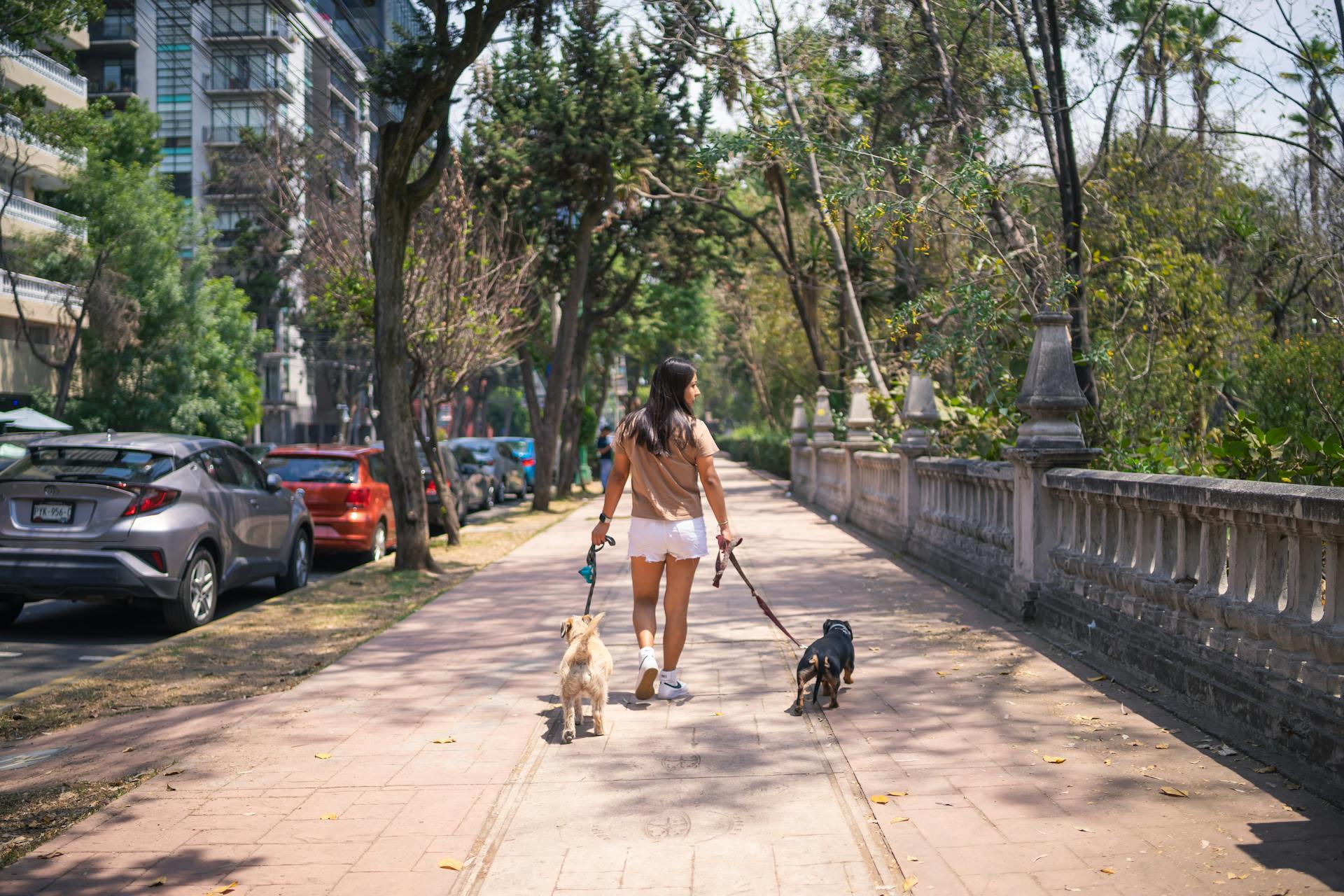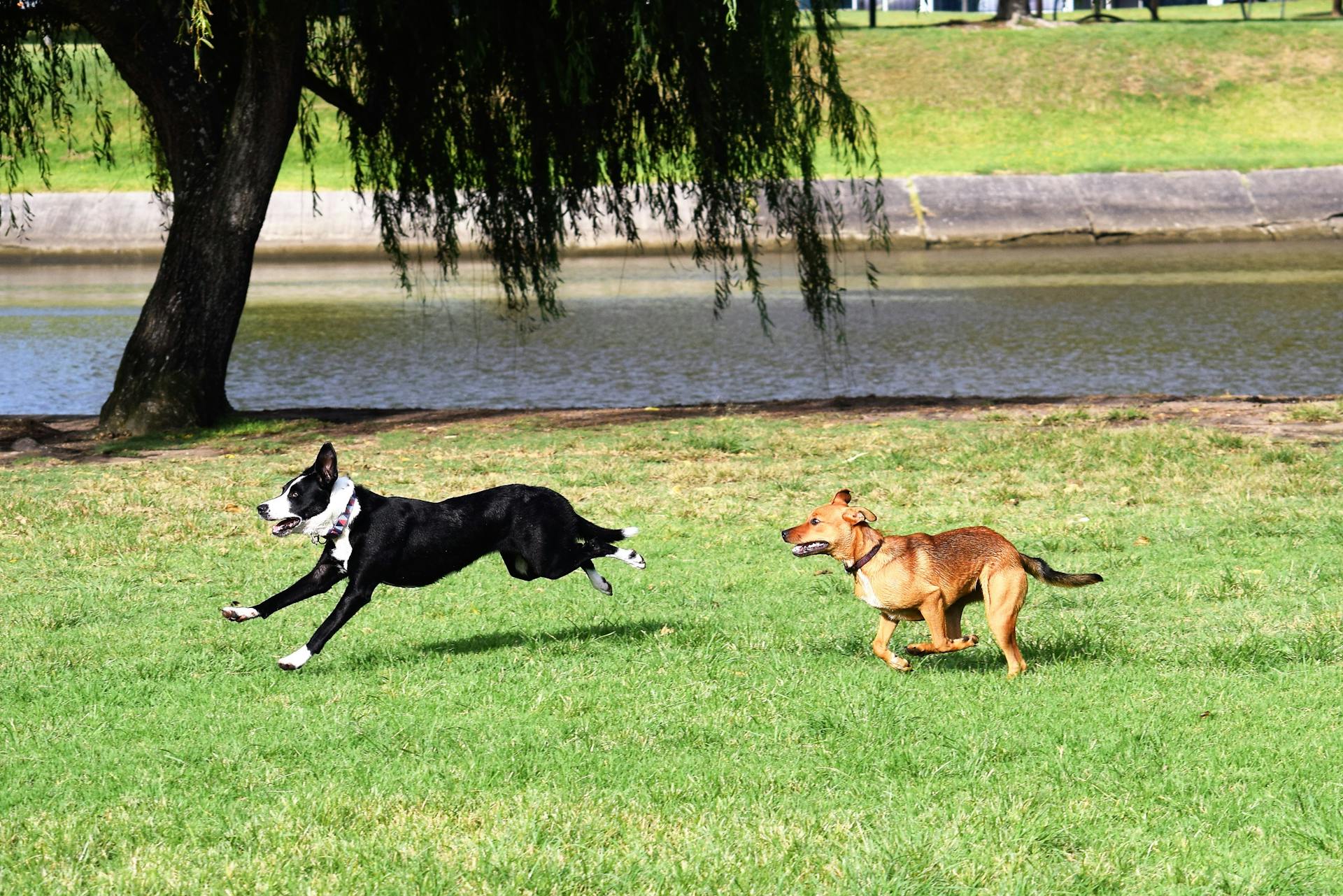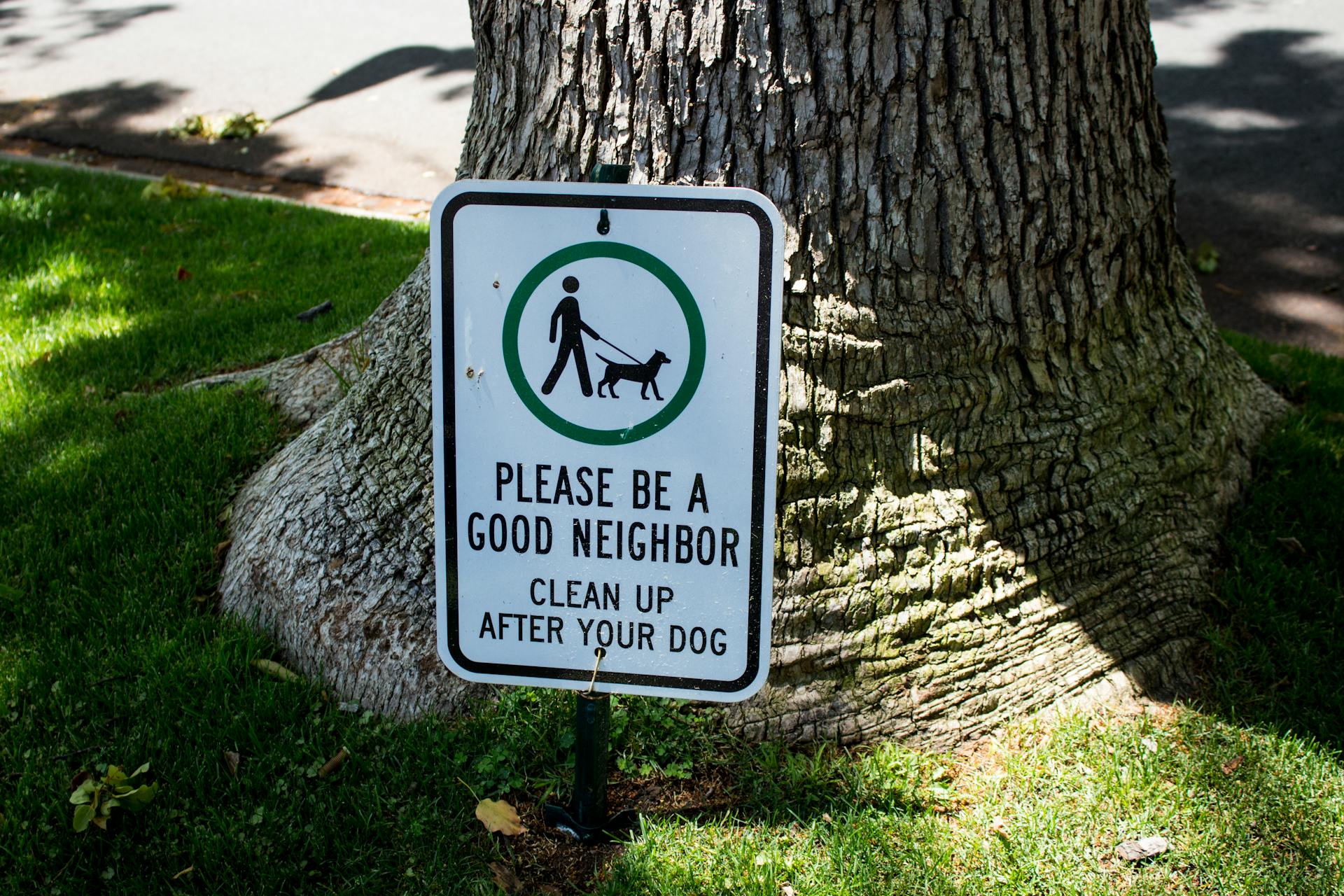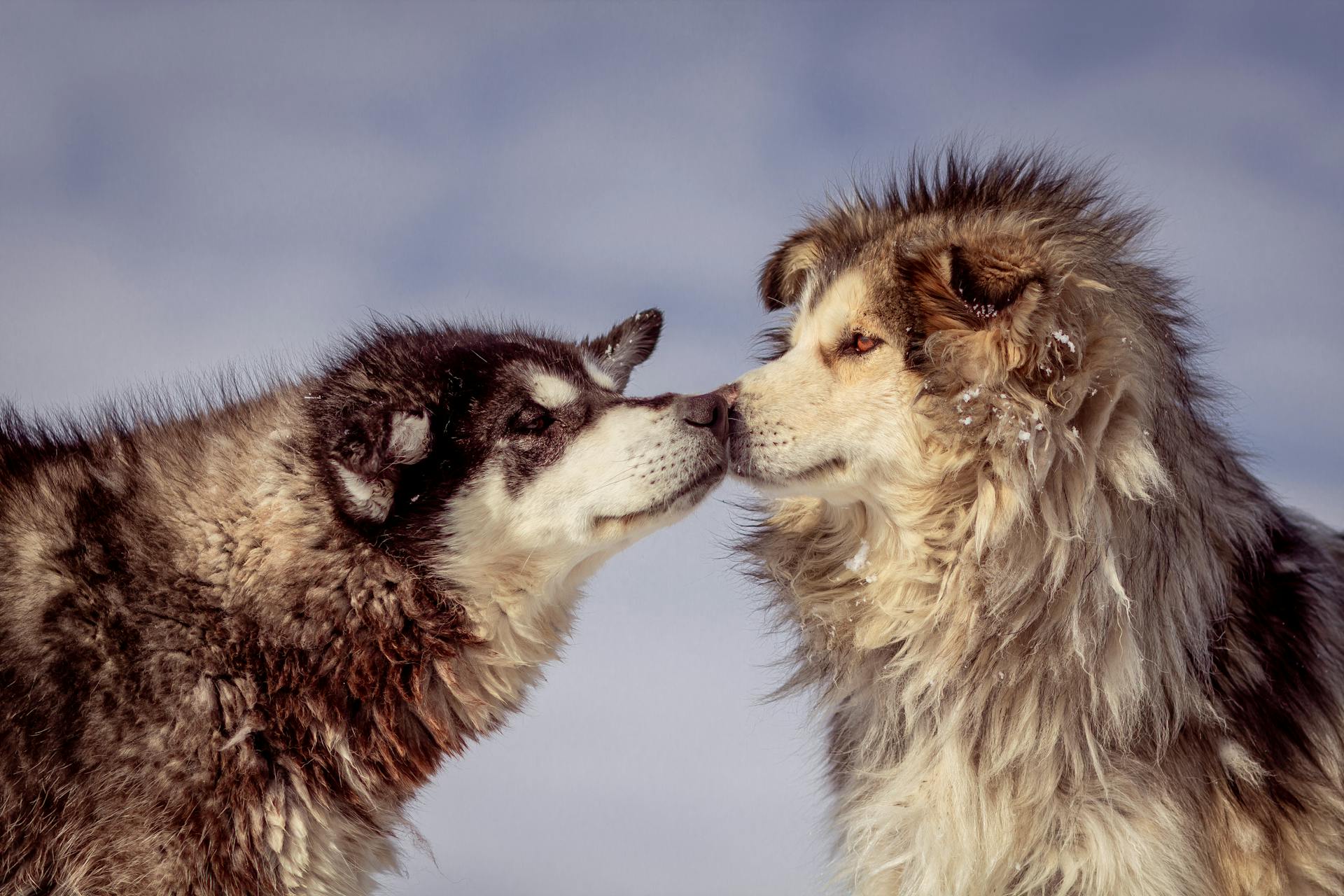
Dogs eating faeces, also known as coprophagia, is a common issue that can be caused by nutritional deficiencies, particularly a lack of protein or fiber in their diet.
Dogs may also eat faeces due to boredom, anxiety, or medical conditions such as gastrointestinal disease.
Regular exercise and mental stimulation can help reduce the likelihood of coprophagia.
Providing a balanced and nutritious diet is key to preventing this behavior.
You might like: Dogs Eating Human Faeces
What Is
Coprophagia is a common problem in dogs and puppies, and it's essential to rule out medical causes before a behavioural diagnosis is made.
Dogs often start eating faeces as puppies, but they can grow out of it as they get older.
It's crucial to have your dog seen by a veterinarian if they're eating feces, as they'll help determine if there are any medical conditions causing the behaviour.
Coprophagia is the scientific term for eating faeces, and it's a rather unpleasant behaviour that many of us will wrinkle our nose up at.
Dogs may eat their own poop or that of another animal, and they can even enjoy eating horse manure, cow dung, or rabbit droppings if given the chance.
Causes and Diagnosis
Dogs eat faeces for a variety of reasons, and it's essential to identify the underlying cause to address the behavior effectively. Medical and physical reasons for coprophagia include intestinal parasites, endocrine pancreatic insufficiency (EPI), underfed or malnourished dogs, and prescription medications that increase hunger.
A veterinarian will perform a physical examination, take the dog's medical history, and run diagnostic tests such as a complete blood count (CBC), serum chemistry panel, and fecal exam to determine the cause of coprophagia. The veterinarian may also want to discuss the dog's diet, daily activities, and regular schedule to identify any underlying health issues.
Some common medical causes of coprophagia include underfeeding or eating a poorly digestible diet, digestive enzyme deficiencies, parasites, vitamin and mineral deficiencies, and malnutrition. Behavioural causes, on the other hand, include curiosity and playfulness, copying other dogs, incorrect training techniques, and innate behaviour.
See what others are reading: Can Stress Cause Pancreatitis in Dogs
Why Does My Dog Eat Cat Poo?
Dogs may eat the faeces of other animals as scavenging behaviour, which is not uncommon in dogs. They're attracted to the smell, texture, and taste of foods, even if we consider them unsanitary.
Dogs interpret smells differently to humans, so poo isn't necessarily an unpleasant smell to them. In fact, poo is an odour that dogs are consistently attracted to when exploring their environment.
It's worth remembering that dogs are naturally curious and may eat non-food items that we consider strange.
Causes and Diagnosis

Causes of coprophagia in dogs are varied and can be divided into medical and behavioral reasons. Medical causes include intestinal parasites, endocrine pancreatic insufficiency, underfeeding, poor quality diet, and prescription medications that make a dog very hungry.
Intestinal parasites are a common cause of coprophagia, as they feed on the dog's nutrients. Dogs may also eat their own feces due to endocrine pancreatic insufficiency, a disorder where the pancreas is not producing digestive enzymes.
Underfeeding and poor quality diet can also lead to coprophagia, as dogs may be malnourished and seek out alternative sources of nutrition. Prescription medications can also contribute to the behavior, as they can increase a dog's hunger.
Behavioral causes of coprophagia include abused dogs that were not fed, puppy mill puppies that were neglected and overcrowded, and dogs that seek attention from their owners.
Dogs may also eat their own feces due to boredom or lack of stimulation, as well as anxiety caused by confinement or isolation.

Here are some possible medical causes of coprophagia:
- Underfeeding or eating a poorly digestible diet
- Digestive enzyme deficiencies
- Parasites
- Vitamin and mineral deficiencies and malnutrition
- Diabetes, Cushing’s disease or thyroid disease
- Some medications containing steroids
A veterinarian can help identify the underlying cause of coprophagia by performing a physical examination, diet evaluation, and testing of stool frequency and consistency. They may also recommend diagnostic tests such as blood work, urinalysis, and fecal exams to rule out underlying health issues.
Learned Behaviour
Coprophagia can be a learned behaviour in dogs, often picked up from their mother or other dogs. This is because female dogs will sometimes ingest their puppy's stool while nesting, which can attract the puppy's attention and encourage them to mimic the behaviour.
Dogs may also copy a ringleader and begin to eat poop due to this learned behaviour. It's not uncommon for a group of dogs to develop this habit together, with one dog leading the way.
If you suspect that your dog's coprophagia is a result of learned behaviour, it's essential to intervene early and consistently. By limiting their access to faeces and preventing them from observing other dogs eating poop, you can help break the habit.
Curious to learn more? Check out: Dog Eating Frozen Dog Poop
Here are some tips to help you prevent your dog from learning this behaviour:
- Limit and prevent access to faeces as much as possible with thorough cleaning, constant supervision when your dog is outdoors, and keeping cat litter out of reach.
- Interrupt or pull on your dog's leash as they sniff poop when out for a walk.
- Train your dog to come to you for a treat following elimination to distract and deter them.
By taking these steps, you can help your dog develop healthier habits and reduce the likelihood of coprophagia becoming a long-term problem.
Treatment and Recovery
Treatment and recovery from coprophagia in dogs requires attention to both medical and behavioral issues.
Parasites can be treated with a de-wormer, and it's essential to wash your dog's bedding, toys, and bowls in hot water to eliminate any remaining eggs. Flooring should also be cleaned and disinfected.
Dogs without medical conditions may be eating feces due to behavioral reasons, and increasing playtime and walks can help them become more content.
Treatment
Treatment is a crucial step in addressing coprophagia in dogs.
Parasites can be eliminated with a de-wormer, but it's essential to wash your dog's bedding, toys, and bowls in hot water to prevent re-infestation.
Your dog's flooring should be cleaned and disinfected to eliminate any remaining eggs.
Dogs with no medical conditions may be eating feces due to behavioral reasons.
More playtime and walks can help alleviate this issue, as exercised dogs tend to be more content.
If your dog persists in eating feces, a veterinarian may recommend a dog behaviorist for further assistance.
Recovery

Recovery from coprophagia in dogs requires a multi-faceted approach that addresses their emotional and physical needs. Dogs are pack animals and do not do well being isolated or confined, so providing them with love, activities, and attention is crucial.
Picking up feces from the yard regularly and keeping the litter box clean can help reduce the temptation to eat feces. This, combined with providing toys and teaching your dog the command "leave it", can be a game-changer in stopping the behavior.
Deterrent soft chews made of natural ingredients can also be an effective tool in preventing coprophagia. These chews can be a useful addition to your dog's daily routine.
Securing pet health insurance today is a smart move to avoid high vet care expenses. The sooner you insure your pet, the more protection you'll have from unexpected vet costs.
Prevention and Management
Managing coprophagia in dogs requires a professional approach, so it's best to consult with a vet for expert advice and support.
If you're concerned about your dog's coprophagia, you can chat with the vets at Vetwest for guidance on identifying and treating the cause of the behaviour.
To prevent dogs from eating faeces, you can try some home-remedies, but it's essential to consult a vet first if your dog is young, very old, or has a history of gastro-intestinal problems.
Manage with Vet
Managing coprophagia requires expert advice and support, which you can get from chatting with your vet. They can help you identify and treat the underlying cause of the behavior.
If you have concerns about your dog's coprophagia, contact your vet for more information on coprophagia advice and treatment. They can provide you with the necessary guidance to achieve long-term success.
Further Preventative Steps
If your dog is prone to eating their own poop, there are some home-remedies you can try to stop the behavior.
You can try these home-remedies one at a time to see which one is successful. However, if your pooch is young, very old, or has a history of gastro-intestinal problems, it's best to consult with a vet before trying these methods.
The Pineapple Method

The Pineapple Method is a popular home remedy for preventing coprophagia in dogs. There is no scientific evidence to support this method.
Some people swear by the pineapple method, but it's essential to note that it's not a proven solution. The theory behind it is that the pineapple chunks in your dog's food give their stool an unpleasant taste that deters them from eating it.
Sources
- https://www.vetwest.com.au/pet-library/why-do-dogs-eat-their-own-poo/
- https://wagwalking.com/condition/coprophagia
- https://www.purina.co.uk/articles/dogs/health/digestion/dog-eating-faeces-coprophagia
- https://www.doglistener.co.uk/dogs_eating-poop-poo-coprophagia-shtml
- https://www.thefarmersdog.com/digest/help-how-can-i-stop-my-dog-from-eating-poop/
Featured Images: pexels.com


